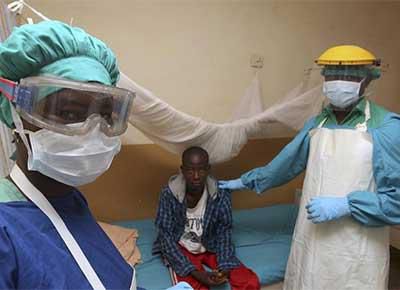The disease was first discovered in Nigeria when two missionary nurses got infected by the virus in 1969.
Ever since then, it has become a disease that Nigeria contends with every year but there is usually an increase in cases between November and May during the dry season.
Experts say the rate of infections in 2020 is alarming when compared to 2019 as at the first week of March, the fever had spread to 27 states across 119 Local Governments.
Confirming the updates, Dr Chikwe Ihekweazu, Director General of Nigeria Centre Disease Control (NCDC) said in week 10, the number of new confirmed cases decreased from 85 cases in week nine, 2020 to 81 cases.
He said that these were reported from 15 States, Edo, Ondo, Ebonyi, Bauchi, Taraba, Plateau, Benue, Kogi, Anambra, Delta, Enugu, Adamawa, Kaduna, Sokoto and Kebbi.
The Director General said that at least one confirmed case had been recorded in a state from 27 states across 119 Local Government Areas.
Ihekweazu, however, said the country had no vaccine yet to protect people against the fever.
![Director General, Nigeria Centre for Disease Control (NCDC), Dr Chikwe Ihekweazu. [Twitter/@Chikwe_I]](https://image.api.sportal365.com/process/smp-images-production/pulse.ng/16082024/95b7d6ba-57e2-4ac8-b4e3-38f77a396110)
“We rely on strengthening measures such as ensuring proper sanitation, good personal hygiene; standard care precautions by health workers etc. to prevent the spread of Lassa fever.
“These measures also depend on personal responsibility as we all have a role to play in preventing the spread of Lassa fever.
“Over the last few years, we have strengthened our surveillance and diagnostics architecture as well as our ability to manage cases.
“Significantly, there has been a reduction in the number of deaths recorded from the disease. Therefore, we have increased our capacity to find and manage cases, compared to previous years,’’ he said.
To contain the situation, he said NCDC was supporting states in responding to the increase in cases as it has deployed Rapid Response Teams to some affected states.
“Our risk communications activities have been scaled up to ensure that Nigerians are aware of the risks of Lassa fever and measures to protect themselves.
“We have also supported states with medical supplies and other response commodities for the management of cases.
“We continue to support treatment centres across the country, to develop the capacity of health care workers to effectively manage cases,’’ he said.
Also, the Minister of Health, Dr Osagie Ehanire, said a lot of work was being done on Lassa fever and the country had reduced fatality rate from 30 per cent to 14 per cent.

Ehanire said Federal Government would soon establish a special laboratory to boost the testing capacity of Lassa fever in the country.
The minister said the country need to boost the capacity of the existing laboratories to test the volume of samples from across the country.
Nigeria has five special laboratories strategically located to test Lassa fever in Ondo, Edo, Abuja, Lagos and Ebonyi states.
The laboratories are located at Nigeria Centre for Disease Control’s (NCDC) National Reference Laboratory in Abuja, Irrua Specialist Teaching Hospital in Edo, Federal Medical Centre Owo in Ondo State, Alex Ekwueme Federal University Teaching Hospital Abakaliki and Lagos University Teaching Hospital.
The minister explained that the new laboratory would make it the 6th special laboratory so that the fever could be treated in most tertiary hospitals in the country.
The minister, however, said that the Irrua Research Specialist Hospital was working on developing a vaccine to address the Lassa fever problem.
He said that a team was working on the first stage of the process, saying; “the team has made a lot of progress.’’
In addition to developing a vaccine to address Lassa fever, Dr Clement Peter, the Officer-in-Charge of World Health Organisation (WHO) in Nigeria advised the Federal Government to advance in it research to provide another drug to treat the fever.

Peter said it was one drug that was presently used for the treatment of Lassa fever in the country, saying “how long do we continue with it?"
Also, he advised on public awareness and good hygiene to prevent the spread.
“Information is fundamental for people to be aware of what they should do to prevent the fever.
“People need to know what Lassa fever is. People need to know how to protect themselves. A lot of these can be done through awareness.
“It is a pattern; in other countries that we have seen, rats tend to produce more when food is available, when food is not covered or stored very well. They feed on it and multiply.
“Also, when houses are not clean, it provides opportunity to interact with rats and the population; other thing is the hygiene aspect of it; sometimes food is not covered properly.
“So, let people know about it,’’ he said.
In all, analysts said stakeholders should improve on surveillance, public awareness and capacity building for the health workers.
They noted that since Lassa fever is endemic in Nigeria, there is need for more awareness creation on hygiene, active surveillance and case definition of Lassa fever to designated treatment centres.
)
![Aisha blows hot on Security forces; Y7ou won't believe what she said [VIDEO]](https://image.api.sportal365.com/process/smp-images-production/pulse.ng/17082024/1f976edf-1ee2-4644-8ba1-7b52359e1a8f?operations=autocrop(640:427))
)
)
)
![Lagos state Governor, Babajide Sanwo-Olu visited the Infectious Disease Hospital in Yaba where the Coronavirus index patient is being managed. [Twitter/@jidesanwoolu]](https://image.api.sportal365.com/process/smp-images-production/pulse.ng/16082024/377b73a6-190e-4c77-b687-ca4cb1ee7489?operations=autocrop(236:157))
)
)
)
)
)
)
)
)
)
)
)